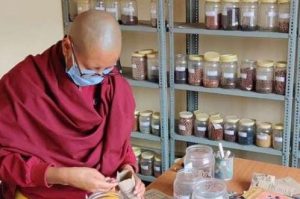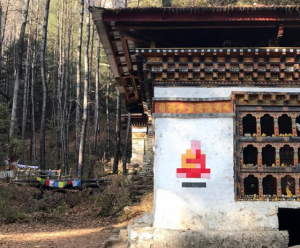
The Korean Seon (Zen) master Venerable Pomnyun Sunim (법륜스님) wears many hats: Buddhist monk, teacher, author, environmentalist, and social activist, to name a few. As a widely respected Dharma teacher and a tireless socially engaged activist in his native South Korea, Ven. Pomnyun Sunim has founded numerous Dharma-based organizations, initiatives, and projects that are active across the world. Among them, Jungto Society, a volunteer-based community founded on the Buddhist teachings and expressing equality, simple living, and sustainability, is dedicated to addressing modern social issues that lead to suffering, including environmental degradation, poverty, and conflict.
The following article shared by Jungto Society is part of a series of highlights from Ven. Pomnyun Sunim’s writings, teachings, public talks, and regular live-streamed Dharma Q+A sessions, which are accessible across the globe.

Q. When discussing reunification on the Korean Peninsula, it’s likely that the problem of wealth disparity between the two Koreas will become significant, and negative issues such as jealousy, arrogance, and crime could come to the forefront. What kind of education should we provide to young people who display indifference or opposition toward reunification?
Ven. Pomnyun Sunim: If North Korea were to collapse and South Korea were to merge with it, numerous social problems would arise. Unification would result in North Koreans becoming the second-largest population in a unified Korea. Looking at the reunification of Germany 30 years ago, despite their political proficiency, an income gap between Germans from the east and west persists. There were various side effects, but few Germans believe that not reunifying would have been a better option.
In my view, if North Korea were to collapse due to internal issues, South Korea should embrace and reunify with it. We cannot allow a collapsed North to be absorbed by China, can we? Regardless of the pressures involved, I believe South Korea should embrace the situation. However, intentionally causing the collapse of North Korea for the purpose of reunification is not desirable. This would lead to serious conflicts, an increased risk of war, and an enormous burden even after reunification. If reunification were forced, South Korea would bear full responsibility post-reunification.
If South Korea clearly adopts a position that does not force North Korea to reunify, the North could avoid the threat of regime collapse and engage in mutual cooperation with South Korea. We can then take the time to explore ways to maintain our respective systems, similar to the European Union, while unifying our currencies. Instead of striving for complete unity, we could maintain our own political systems, similar to the EU, while allowing for freedom of movement.
Currently, most of North Korea’s social infrastructure is in disrepair. Developing North Korea would provide significant employment opportunities for young people in South Korea. There’s no need to rely on funding from other countries for North Korea’s development. South Korea possesses substantial financial resources that have yet to find suitable investment destinations. Many foreign experts consider North Korea as the world’s best investment opportunity. While most countries in Northeast Asia are already developed, North Korea remains undeveloped. To put it simply, it’s like having an untapped gold mine in the middle of Seoul: no one can exploit it due to the associated risks. If those risks were eliminated, it could become an excellent investment opportunity.
Furthermore, North Korea possesses a high-quality labor force and abundant reserves of rare metals. It is rich in rare earths, lithium, magnesium, and germanium, which have been problematic due to China’s dominance in this sector. Thus, the improvement of inter-Korean relations would be highly welcomed as North Korea’s resources could address some of the raw materials shortages faced by industries around the world.
Additionally, the Trans-Siberian Railway could be connected through North Korea. This would allow numerous small and medium-sized South Korean companies to participate in North Korea’s development. If these companies, which have lost their competitiveness, join in North Korea’s development, they could experience significant growth over the next 20 years. This would also create numerous job opportunities for young people.
While North Koreans would contribute to the labor force if railways were built in North Korea, South Koreans would predominantly handle engineering tasks. If a branch office were established in North Korea, the South Korean headquarters would need to expand its workforce. Effective cooperation between North and South Korean politicians, coupled with the development of North Korea, could result in substantial job creation.
Investing in North Korea would yield significant economic benefits as long as North Korea remains secure. Therefore, it is incorrect for young people in South Korea to believe that reunification with a thriving North Korea would cause extensive damage.
Convincing young people solely based on the premise of a shared ethnicity and the necessity of reunification is no longer sufficient. We must explain how reunification would greatly benefit them. Of course, reunification is crucial because we are the same people and it is necessary for peace. However, in today’s world, it is more important for young people to consider how it would personally benefit them. I firmly believe that reunification can bring tremendous advantages.

Q. Can I pursue personal happiness while also contributing to peace on the Korean Peninsula? Reunification of the two Koreas and peace are extremely important, but if individuals themselves are not happy, social engagement can be challenging, no matter how worthwhile. So how can I lead a life that balances personal happiness while also being socially engaged?”
Ven. Pomnyun Sunim: I share the same sentiment as the questioner. As the saying goes: “I have my own fish to fry,” which means that one cannot be concerned about addressing too many issues. In other words, when we experience suffering, our focus narrows. In Buddhist practice, I always emphasize personal happiness as a starting point. However, prioritizing personal happiness does not mean that “I am the only one who should be happy.” In my own experience, once my own problems were alleviated to some extent, I naturally became interested in others. When we are burdened by our own struggles, we tend to focus solely on ourselves and fail to see the person next to us. And even if we do notice them, we are unable to assist them as our own burdens weigh us down. However, when our own burdens are lightened and our hands are freed from the need to do something urgently, we can look around and see the needs of others. We might notice someone carrying a heavy load and feel compelled to help. Therefore, relieving an individual’s suffering can lay the foundation for them to help others.
Usually, members of Jungto Society initially come to me seeking guidance for their marital and familial struggles. However, once their personal concerns are somewhat resolved, they engage in activities such as reducing consumption to protect the environment, practicing sharing for children in developing countries, advocating for peace on the Korean Peninsula, and even participating in fundraising. I believe that our actions should form the basis for such social engagement, rather than merely pursuing individual happiness. When individuals are burdened by personal suffering, they cannot consistently engage in, say, sports or social activities because then they are more likely to give up halfway. Therefore, personal happiness and familial peace serve as the foundation for world peace. By adopting this perspective and actively participating in social engagement, we can sustain our efforts for an extended period of time.
See more
Pomnyun
Jungto Society
JTS Korea
JTS America
International Network of Engaged Buddhists
Related videos from BDG
Dharma Q+A with Ven. Pomnyun Sunim
Wisdom Notes from Ven. Pomnyun Sunim
Related features from BDG
In the Footsteps of the Buddha: Ven. Pomnyun Sunim Leads 1,250 Jungto Practitioners on a Pilgrimage to India
Ven. Pomnyun Sunim: Buddhism in a Divided World
The Hungry Should Eat: JTS Brings Buddhist Compassion and Relief to India
Engaged Buddhism: Seon Master Pomnyun Sunim Pledges 10,000 Tons of Food Aid for Children in North Korea
Engaging with Suffering, Realizing Freedom: An Interview with Ven. Pomnyun Sunim
Related news reports from BDG
Ven. Pomnyun Sunim Joins Religious Leaders in Interfaith Peace Declaration on 70th Anniversary of Armistice on the Korean Peninsula
Pathways to Peace: Ven. Pomnyun Sunim Delivers Talk on Rising Tensions on the Korean Peninsula
Engaged Buddhism: Ven. Pomnyun Sunim Joins JTS Korea Volunteers for Humanitarian Relief Work in Türkiye
Engaged Buddhism: JTS Korea Distributes Humanitarian Aid in Pakistan
Engaged Buddhism: Ven. Pomnyun Sunim and JTS Volunteers Visit Sujata Academy Project in India
Engaged Buddhism: Ven. Pomnyun Sunim and JTS Volunteers Bring 100,000 Gas Stoves to Rohingya Refugees in Bangladesh
Engaged Buddhism: Ven. Pomnyun Sunim Shares the Fruits of Compassion to Mark the Birth of the Buddha
Engaged Buddhism: Ven. Pomnyun Sunim Delivers Compassion to the Vulnerable in Korea
Engaged Buddhism: Jungto Society Delivers Compassion for the Vulnerable in Korea
Engaged Buddhism: JTS Korea Distributes Emergency Flood Relief in Cambodia












